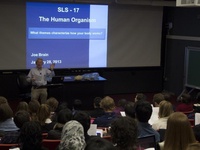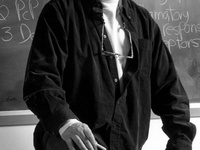“It’s always impressive to me how health and biology and medicine touch these parts of people’s lives,” Long Sieber said. “Kids coming from very diverse backgrounds will find something interesting about the class, [whether a] government major, history—even if you’re studying French literature. There’s always something there that’s going to...have something to do with public health.”
Long Sieber is an adjunct physiology lecturer at the School of Public Health and currently co-teaches the course with Brain and Stephanie A. Shore, a senior lecturer on physiology at the School of Public Health.
Students who have taken the course over the years say that they have been able to examine topics in the humanities and the social sciences from a new perspective. Ana I. Mendy ’09 took “The Human Organism” as a sophomore to fulfill a Core requirement, but she ended up finding the topic section and the research she conducted for her term paper useful for a much larger project—her senior thesis.
Mendy, a history concentrator, had already been contemplating writing a thesis on the Haitian Revolution when she studied battlefield medicine for her topic section in Brain’s course. While writing her term paper on Haiti, she read literature that ultimately served as groundwork for her thesis research.
“That’s why I really liked [the class],” said Mendy, who is a former Crimson editorial writer. “It’s not only that the class was friendly for people who were not in science, but it was also a class that allowed you to do applied science to whatever you’re excited about, which in my case was history.”
CONNECTIONS IN REAL TIME
While striving to connect the course to themes in public health and students’ other academic interests, Brain has also sought to make his course timely.
According to current head teaching fellow Jennifer L. Garza, Brain continually revises the course to relate it to current events. In 2009, when a swine flu outbreak led to fears of an international pandemic, Brain adjusted his curriculum to devote time to covering the disease.
“He’s really good about adjusting from year to year what he teaches in order to be really relevant and capture the interest of the students,” said Garza, who is entering her fourth year teaching the course as a teaching fellow. “I think he is a fundamental part of setting the tone of the class.”
Long Sieber also lauded her colleague’s skill in making his subject material relevant across time and discipline.
“I’ll miss his enthusiasm, his wide range of knowledge, his ability to just move from one topic to another and see connections,” Long Sieber said. “[Brain] can find relevance in things that I just think are two different subjects. It’s a really hard thing to replace.”
Long Sieber, who works in an office right door next to Brain, said she hopes to continue teaching the course in the future, even as soon as 2015.
“[I want] to continue to make it the very relevant and timely course that he’s managed to maintain for all these years,” Long Sieber said.
—Staff writer Madeline R. Conway can be reached at mconway@college.harvard.edu.
This article has been revised to reflect the following correction:
CORRECTION: Jan. 30, 2013
An earlier version of the caption accompanying a photo related to this story incorrectly stated that Harvard School of Public Health Professor Joseph D. Brain has taught “The Human Organism” for nearly 30 years. In fact, Brain has offered the course each year for 40 of the past 41 years.










